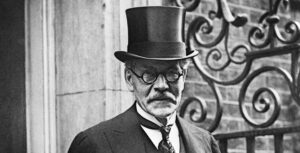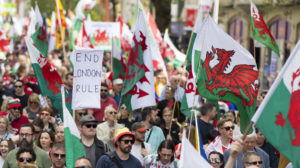Last year, I found myself back in the Rhondda valley and the village where I spent most of my childhood. As I walked through its typically inclement grey terraced streets, I came upon the boarded-up premises of the Ton and Pentre Labour and Progressive Club. Dereliction and a sense of decaying nobility are common features of the streets here, with clubs, institutes, chapels and all other sites of congregation looking the same. This vacant building that held many notable trade union meetings was one of the longest-running working men’s establishments in the Rhondda. Now it stands as a monument to failure. What can be said about such a relic, whose name alone testifies to everything this valley once stood for?
Because these former mining valleys in the wilds of Glamorgan were the cradle of working-class politics in Britain. Revolutionary socialism is almost as old as the mining communities in these hills: the red flag of socialism was flown for the very first time in anger over the skies of Merthyr Tydfil in 1831. And, in time, this people and landscape gave rise to the British labour movement and the party that bears its name, a party that knew who it represented and what it wanted to change.
Keir Hardie, Labour’s founding father, was elected MP for the Merthyr and Aberdare constituency only a few years before he would oversee the transition from the Independent Labour Party to the more familiar abbreviated title in 1906. A former miner who first entered the darkness of the pits at just 10-years old, he knew first-hand the toils and struggles faced by these hardened communities, and never forgot them in Parliament, wearing a deerstalker and tweed jacket in place of the expected top hat and tails. But Hardie himself never lived to see the party he conceived in power. An idealist and a pacifist, he died a broken man in 1915, as his contentious objections to the First World War (on the basis of the working-class dead and war profiteering) went unheeded.
Just nine years later though, and 100 years ago this week, the Labour Party did form its first government. It was led, though, by a Scot, Ramsay Macdonald, later expelled as a traitor and a turncoat for his collaboration with the Conservatives. Throughout this fractious period, as the Labour Party split and reformed, mutated and reorganised, South Wales remained its natural home. It was here that institutions later synonymous with the party, such as the National Union of Miners, were first established. And the area produced the radical autodidactic streak that gave Labour’s second prime minister, Clement Atlee, his greatest lieutenant: Nye Bevan gained his education in the libraries and reading rooms of Tredegar’s Miners’ institutes, arguably the most impressive educational bodies promoting the socialist cause anywhere in Europe.
Nationwide, the party’s electoral fortunes waxed and waned after the war and into the Sixties. But, like working-class industrial regions across the United Kingdom, the party’s grip in South Wales was as firm as the iron smelted in the furnace-town of Hardie’s coronation. But now this relationship has been lost. A proud heritage has withered, and Labour means as little to these parts as “politics” itself. Understanding how such a bond could be neglected and dismantled is essential to understanding the story of Labour over the past century, and its origin can be traced to a single moment: the tragedy that stopped a school clock dead at 9.13am one Friday morning that became the moment of reckoning.
Some places are so synonymous with a tragedy that their very name becomes a byword for unimaginable suffering. Today, our own most baleful metonym is probably “Grenfell”, immediately evoking corruption, betrayal and the dereliction of state duty. But in the valleys of South Wales, a different tragedy bears a single name: Aberfan. That was the village where, on the morning of 21 October 1966, approximately 105,000 cubic metres of discarded coal waste slid into the community and engulfed the Pant Glas school and houses below. Half the town’s children were wiped out by the black avalanche that sped down the slopes, along with 28 adults.
Aberfan had already been foretold through numerous warnings, and in previous slippages in both the village itself and nearby. But even as the slurry settled and the spoil began to be cleared, the story was only just beginning. Much as at Grenfell, those who should have been held responsible, the people this community had most faith in, were absolved of any responsibility. John Collins, whose entire family was taken by the black mountain, later said: “I was tormented by the fact that the people I was seeking justice from were my people — a Labour government, a Labour council, a Labour nationalised coal board.” This Establishment cover-up was fatal. As veteran BBC broadcaster Vincent Kane later added: “Half a dozen or so organisations or individuals should have brought help to those stricken people, but instead they betrayed them.”
The central figure in this episode was Lord Robens who, as Chairman of the National Coal Board, continually presented himself as a defender of coal, while overseeing widespread pit closures. His arrogance was matched only by the lack of compassion he showed towards the families of the bereaved. Insult piled upon injury as the official tribunal into the cause of the disaster was marred by misinformation, delays and attempts to obstruct the truth. And the victims could see it — as a father of one of the bereaved children cried out when giving evidence: “Buried alive by the National Coal Board. That is what I want to see on record. That is the feeling of those present. Those are the words we want to go on the certificate”.
Worse was to follow: it was at the behest of the Labour Minister for Wales — the valleys-born George Thomas, later Lord Tonypandy — that the villagers themselves were required pay to remove remaining slag heaps still towering over their homes from the disaster relief fund. But this tragedy was to become the epicentre of a far greater conjuncture, where Wales began to reckon with all the false promises of industrialisation and unionism. If there is no history of South Wales without Aberfan, there is no complete history of the Labour Party which does not chapter the devastation and fury it sowed in this heartland. And, while the latter part of the Sixties was marked by the beginnings of a turn away from Labour, the following decade saw nothing arrive to replace it. Voter turnout in elections started to decline, while industrial action by the miners threw the country into darkness, a faction of the working class seemingly at war with the country — and, after the 1974 election, at war with a Labour government too.
Labour’s hold here wasn’t immediately severed. A son of the valleys, the Tredegar-born Neil Kinnock, would later assume the helm as Margaret Thatcher instigated a very different kind of revolution. An impressive intellect and pragmatist, Kinnock’s accent and bearing connected the party back to its past. He could speak with genuine feeling of the strength of those communities, “who could work eight hours underground and then come up and play football”. But that would in part be his undoing: a conservative national press constantly mocked his “boyo” persona. And while he could give voice to South Wales through his own, it ultimately became the voice of political defeat, as the pits central to valley-life were shut and sealed, something the Labour Party proved powerless to stop.
The coming to power of Tony Blair offered a symbolic rupture from a party once grounded in working-class, Celtic regions. But he too had his ways of disrupting community life, for instance with his insistence that more children from deprived areas should be given the option to attend university. While many rightly welcomed the chance to escape, the continued lack of sustained investment in the South Wales valleys simply meant they had no reason to return. And, as Blair opened more of the country to the punishing writ of the free market, the last vestiges of industry petered out. The last of the pits closed, and some of the most prominent local employers such as Hoover in Merthyr and the Polikoff’s and Burberry factories in the Rhondda, dramatically cut their workforce, until their inevitable closure a decade or so later.
With the National Assembly for Wales established in 1997 following devolution in the Principality, the strength of support for Plaid Cymru, which had been gathering momentum since Aberfan, was now evident in the valley heartlands. By 1999 they would even manage to win seats in the once unimaginable ward of the Rhondda, where the old joke ran that even a Smurf would win should they be dressed in red. Blair’s appeal to Middle England was traded in Wales, and the party barely scrapes ahead of the Conservatives nationally now.
Kinnock was probably the last leader of the Labour Party as it was originally conceived. But he was ultimately given the impossible task of trying to lead a party born in another age, a product of the dire need to have political representation to counter the exploitative nature of industrial capitalism. Now, it has lost its identity, just as much as the people it represented were losing theirs. As Thatcher transformed Britain and placed it at the forefront of the post-industrial neoliberal revolution, without the constancy of a manufacturing and industrial base, was there even any meaning to the term “labour”?
Today, as the party seeks to commemorate 100 years of its electable “progress”, it should turn is attention the places which gave the party its name and yet where poverty and abandonment persist. While you can be sure that disdain for the Conservative Party is still strongly felt, the Labour Party is regarded with something equally dangerous: an apathetic rolling of the eyes by a people whose rolling hills speaks to the layered memories of resigned weathering. Even as another Keir looks set to return the Labour Party to power, Ton and Pentre Labour and Progressive Club won’t suddenly reopen. Suspended in neglect, its rooms will remain empty as another electoral season passes. And all the while, what passes for progress will continue arriving at these towns from elsewhere, just explanations that try and fail to make sense of the greatest dereliction — the dereliction of the mind and soul of a people.
Disclaimer
Some of the posts we share are controversial and we do not necessarily agree with them in the whole extend. Sometimes we agree with the content or part of it but we do not agree with the narration or language. Nevertheless we find them somehow interesting, valuable and/or informative or we share them, because we strongly believe in freedom of speech, free press and journalism. We strongly encourage you to have a critical approach to all the content, do your own research and analysis to build your own opinion.
We would be glad to have your feedback.
Source: UnHerd Read the original article here: https://unherd.com/





